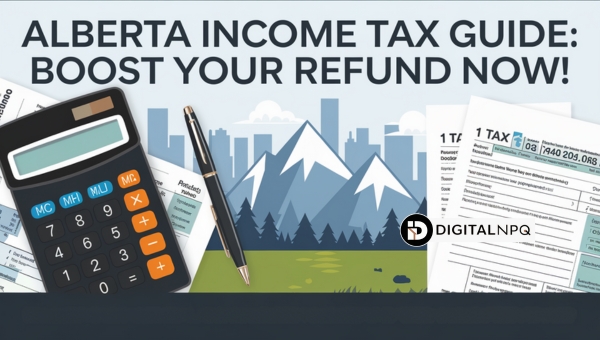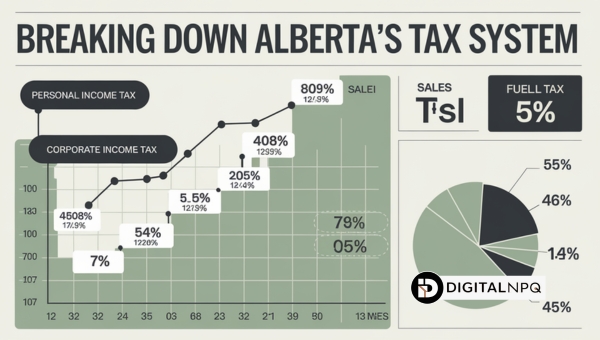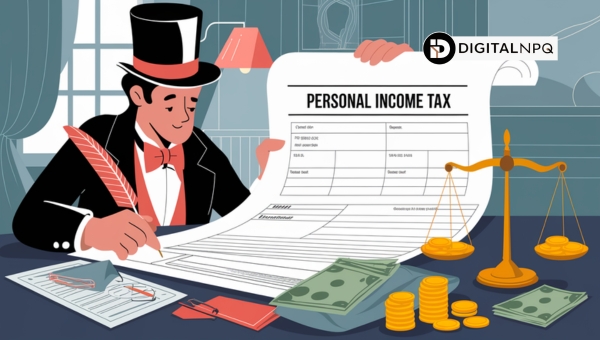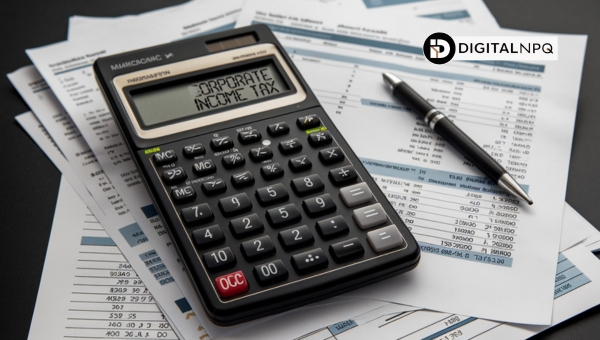Alberta Income Tax Guide: Boost Your Refund Now!

The realm of Alberta income tax can seem daunting, but this article will break it down into easy-to-understand sections. We’ll cover the general structure of Alberta’s tax system, personal income tax brackets and rates, deductions and credits, and filing requirements.
Moreover, we’ll explore corporate tax rates, special taxes, and levies. Lastly, we’ll highlight key changes for 2024, including new tax rates and updates to tax credits. Whether you’re an individual taxpayer or running a business, this comprehensive guide ensures you’re well-prepared for the tax season. Dive in and unlock all the crucial details you need to know.
Breaking Down Alberta’s Tax System
Alberta’s tax system is designed to be simple and competitive, making it appealing for both individuals and businesses. The system primarily consists of personal income tax, corporate income tax, and various special taxes and levies.

- Personal Income Tax: Alberta uses a progressive tax rate structure, which means higher income levels are taxed at higher rates.
- Corporate Income Tax: Alberta features one of the lowest corporate tax rates in Canada, making it an attractive place for business operations.
- Special Taxes and Levies: These include taxes like the Alternative Minimum Tax (AMT) and the Education Property Tax, which are applied under specific conditions.
Understanding these components is crucial for effective financial planning.
Personal Income Tax
When it comes to personal income tax in Alberta, understanding the basics is essential for every taxpayer. From tax brackets and rates to available deductions and credits, knowing the details can help you manage your finances more effectively. Additionally, being aware of the filing requirements ensures you stay compliant and avoid unnecessary penalties.

Tax Brackets and Rates
Alberta’s personal income tax rates are structured to be straightforward. Here’s how the brackets and rates break down for individuals:
- Up to $131,220: 10%
- $131,221 to $157,464: 12%
- $157,465 to $209,952: 13%
- $209,953 to $314,928: 14%
- Over $314,928: 15%
These brackets apply to the taxable income of residents, making it crucial to know where your income falls.
Deductions and Credits
Various deductions and credits are available to help reduce your taxable income. Here are some key ones to consider:
- Basic Personal Amount: Every taxpayer is entitled to a basic amount that is not taxable.
- Spousal Amount: Available if you support your spouse or common-law partner.
- Medical Expense Credit: Helps offset medical expenses.
- Charitable Donations Credit: Encourages charitable contributions by reducing taxable income.
These deductions and credits can significantly lower the amount of tax you owe.
Filing Requirements
To stay compliant, it’s important to follow Alberta’s tax filing requirements:
- Deadline: Personal income tax returns must be filed by April 30 each year.
- Self-Employed: If you are self-employed, you have until June 15 to file, but any taxes owed must be paid by April 30.
- Documentation: Ensure you have all necessary documents, such as T4 slips and receipts for deductions.
Meeting these requirements helps you avoid penalties and ensures your tax affairs are in order.
Corporate Income Tax
Navigating corporate income tax in Alberta is essential for businesses to ensure compliance and optimize their tax obligations. We will delve into the specific tax rates and filing requirements that companies in Alberta need to be aware of.

Tax Rates
Alberta’s corporate tax rates are designed to be competitive and business-friendly. The province offers:
- General corporate tax rate: 8% on taxable income.
- Small business tax rate: 2% on the first $500,000 of active business income.
These rates make Alberta an attractive location for businesses, supporting economic growth and investment.
Filing Requirements
Corporations in Alberta must adhere to specific filing requirements to remain in good standing. These include:
- Annual tax return: Corporations must file their income tax return within six months of their fiscal year-end.
- Quarterly installments: Businesses are required to make quarterly tax payments based on their estimated annual tax liability.
- Record keeping: Maintaining accurate and comprehensive financial records is crucial for accurate reporting and compliance.
By understanding and following these requirements, corporations can effectively manage their tax responsibilities in Alberta.
Also Read: Canada Holidays 2024: Best Guide to Festivals & Travel
Special Taxes and Levies
Understanding the special taxes and levies in Alberta is essential for both individuals and businesses. These taxes can impact your financial planning and obligations. Below, we delve into some of the most important special taxes and levies in Alberta.
Alternative Minimum Tax (AMT)
The Alternative Minimum Tax (AMT) is designed to ensure that taxpayers with high incomes pay a minimum amount of tax. It primarily impacts those who have significant tax deductions or credits.
- Calculation: The AMT is calculated by adding back certain deductions and credits to your taxable income.
- Threshold: If your adjusted taxable income exceeds the AMT exemption, you may be subject to AMT.
- Impact: This tax ensures that high-income earners contribute a fair share by preventing excessive use of deductions and credits.
Education Property Tax
The Education Property Tax is a crucial source of funding for Alberta’s public education system. It applies to both residential and non-residential properties.
- Assessment: The tax is based on the assessed value of your property.
- Rate Setting: The provincial government sets the tax rate annually.
- Purpose: The revenue generated supports educational institutions across the province.
Other Levies
In addition to AMT and Education Property Tax, Alberta imposes various other levies that residents and businesses should be aware of.
- Carbon Levy: Targets greenhouse gas emissions to encourage environmental responsibility.
- Fuel Tax: Applied to gasoline and diesel purchases to fund infrastructure projects.
- Tobacco Tax: Imposed on tobacco products to discourage smoking and support healthcare initiatives.
- Insurance Premium Tax: Levied on insurance premiums to fund regulatory and administrative costs.
Understanding these taxes and levies helps in effective financial planning and ensures compliance with Alberta’s tax regulations.
Also Read: Minimum Wage in Canada: Essential 2024 Guide
Major Changes to Alberta Income Tax
2024 brings several updates to Alberta income tax system that residents and businesses should be aware of. These changes include adjustments to tax rates, thresholds, and tax credits, which are designed to reflect the evolving economic landscape.
New Tax Rates and Thresholds
In 2024, Alberta made some notable adjustments to its tax rates and thresholds. The new tax brackets and rates are as follows:
- 25% on the first $55,867 of taxable income.
- 30.5% on income over $55,867 up to $111,733.
- 36% on income over $111,733 up to $148,269.
- 38% on income over $148,269 up to $173,205.
- 41.32% on income over $173,205 up to $177,922.
- 42.32% on income over $177,922 up to $237,230.
- 43.32% on income over $237,230 up to $246,752.
- 47% on income over $246,752 up to $355,845.
- 48% on income over $355,845.
These changes reflect an indexation factor of 1.042 (4.2% increase) for provincial tax brackets and personal tax credit amounts.
Tax Credits Updates
For the 2024 tax year, there have been updates to various tax credits, aimed at providing relief and incentives to taxpayers:
- Basic Personal Amount: Adjusted to reflect inflation.
- Spousal Amount: Updated in line with the basic personal amount.
- Medical Expense Credit: Increased to help offset rising healthcare costs.
- Charitable Donations Credit: Enhanced to encourage more charitable giving.
- Political Contributions Credit: Revised to support political engagement.
These updates ensure that taxpayers can benefit from inflation-adjusted credits, making it easier to manage their financial responsibilities.
FAQs
Which province has the lowest taxes?
Alberta is known for having one of the lowest overall tax rates in Canada. This includes both personal and corporate income taxes, making it attractive for residents and businesses alike.
How much income is tax-free in Alberta?
In Alberta, the basic personal amount for the 2024 tax year is $21,003. This means that the first $21,003 of an individual’s income is not subject to provincial income tax.
Are taxes higher in Canada or the USA?
Generally, taxes are higher in Canada compared to the USA. This is due to the broader range of social services provided by the Canadian government, which are funded through higher tax rates.
Conclusion
Alberta’s income tax system is designed to be both straightforward and competitive, catering to the needs of individuals and businesses alike. From personal and corporate tax rates to various deductions, credits, and special levies, understanding these components is crucial for effective financial planning. Keeping up-to-date with key changes and filing requirements ensures compliance and optimal tax benefits.
By staying informed, residents and businesses in Alberta can navigate the tax landscape with confidence and ease. If you found this information helpful, explore more detailed articles on our site to stay informed about Alberta’s tax system and other financial topics!
